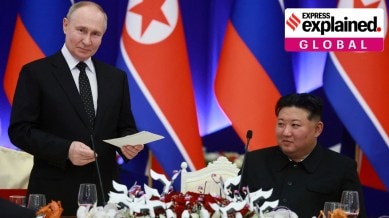Why the Russia-North Korea pact is a big deal
North Korea and Russia have agreed to provide immediate military assistance if either faces armed aggression, according to the landmark pact.

Russia President Vladimir Putin’s recent Pyongyang visit culminated with a landmark pact between Russia and North Korea for “immediate military assistance if either faces armed aggression”.
Here is what this means, and why this pact is significant.
But first, some historical context
After World War II, the erstwhile Soviet Union wanted the installation of a communist regime in Korea, and offered significant military assistance to North Korea founder Kim Il Sung during the Korean War. After hostilities ended, the USSR, along with China, provided significant military and other aid to the communist North.
The two nations solidified their alliance in 1961, with the signing of the Russo-North Korea Treaty of Friendship, Cooperation and Mutual Assistance, which like the latest pact contained a mutual defence agreement. After the dissolution of the Soviet Union in 1991, this treaty was voided and relations temporarily deteriorated.
Since the early 2000s, however, Putin-ruled Russia has gotten closer to the Kim-family ruled North Korea regime. That being said, Russia still did not back North Korea’s nuclear ambitions, and for a time, even supported sanctions against the country aimed at curbing Pyongyang’s nuclear capabilities.
Things changed for good in 2022, as Russia invaded Ukraine and Putin found himself increasingly isolated, internationally. Today, the world is as divided as it has been since the end of the Cold War, Russia and North Korea stand together against the Western liberal order, based on highly pragmatic considerations.
What the pact says
The pact between Russia and North Korea talks about cooperation on a wide range of issues, including mutual military support, and unspecified technological assistance. Crucial is the mutual defence provisions.
This provision echoes the 1961 agreement between the two nations. Sue Mi Terry, Senior Fellow for Korea Studies in the Council for Foreign relations said:
“Because neither country is likely to be attacked by an aggressor, the mutual defense provision is unlikely to be invoked… The more likely consequence of the treaty is simply closer cooperation in weapons production, with North Korea manufacturing more munitions for Russia and Russia providing more high-end help for North Korea’s nuclear and missile programs… Both countries will become more dangerous as a result of this new partnership”.
The provision of technological assistance is likely to be crucial. Currently, North Korea is believed to possess nuclear weapons but lacks critical missile guidance systems, cutting-edge warhead design, and re-entry vehicle technology, precluding its development of advanced, long-range nuclear weapons.
Strategic implications
For South Korea and Japan, this treaty is likely to be perceived as a direct security threat. Both countries have long been concerned about North Korea’s nuclear program, and military strength. The Russian security umbrella will only add to these concerns.
This is likely to push both countries to strengthen their defences and rethink their security policies. Japan has already moved away from its long-standing pacifist foreign policy, and is in the process of building its military might. South Korea convened an emergency meeting of its national security council in response, and said it will now consider sending arms to Ukraine, something which it had thus far resisted.
Both South Korea and Japan are likely going to further cement their alliance with the United States, in response.
The United States has already reaffirmed its commitment to its allies. NATO chief Jens Stoltenberg too has expressed deep concern about the pact, highlighting the risks to global security and the potential for increased nuclear proliferation. “We need to be aware that authoritarian powers are increasingly joining forces and supporting each other in a way we have never seen before,” he said at a panel discussion during an official visit to Ottawa.
The Russia-North Korea pact could also encourage similar partnerships, elsewhere, most notably with Iran. For the West, these will continue to pose a major threat.
China, a traditional ally to North Korea, is likely to be conflicted about the development. While the treaty strengthens the anti-West bulwark in Asia, China would be wary of Russia’s growing military collaboration with North Korea, which could undermine its near-exclusive geopolitical influence over Pyongyang. It would also be concerned about a greater Western footprint in Asia, as a result of this development.
The writer is currently interning with The Indian Express